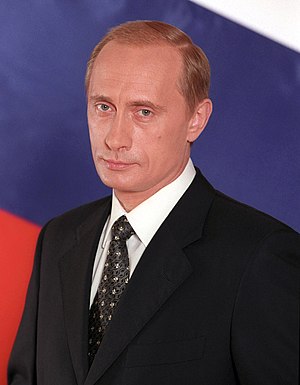 Image via Wikipedia
Image via WikipediaMuch to my surprise, Brussels (but more likely Berlin) has been working tirelessly and quietly to remove the burden of Russian control over Europe’s (but actually Germany’s) severe dependence on gas from Siberia.
The European Union and Azerbaijan signed a deal Thursday in which Baku commits to supply Europe with "substantial volumes of gas," an agreement the EU said was an important step to reduce the bloc's dependence on deliveries from Russia.
Russia has used its energy resources as a weapon – not necessarily directly against Europe, but targeting Ukraine and Belarus. The strategy is aimed, and has largely succeeded, in assisting Moscow’s initial key foreign policy goals of regaining control of Ukraine and maintaining a thumb on Minsk. In doing so, however, Moscow alarmed Europe which needed to reduce gas imports from Russia before Russia began to use that same leverage to pressure the EU into ever more pro-Russian positions. The Kremlin’s energy gambit would allow it to loosen the support given by the EU to the Baltics, Poland and reduce other EU initiatives in the Caucuses and Central Asia. France, but not Germany, is immune to Russian pressure because of its huge nuclear energy facilities (a technology in which it is now the world leader).
The Russian move to bring Ukraine and the Caucuses back under its control was a key foreign policy goal of the Kremlin. The Russian Federation is a shell without Ukraine and the Caucuses is a buffer zone, like Belarus. The methods, however, were Putin’s. Without compunction, Putin’s Russia blatantly interfered in Ukrainian elections, invaded Georgia, signed virtually permanent military agreements with Armenia (outflanking Georgia and the West) and used disputes over gas pricing and transit fees with Ukraine to cut off gas supplies which happened to flow west. Europe, much to my surprise I admit, got the point and has started taking some action.
The faux democracy, single media environment of Russia built by Putin is now seeing some of its egg layers home to roost and one of them is named Nabucco.
The European Union and Azerbaijan signed a deal Thursday in which Baku commits to supply Europe with "substantial volumes of gas," an agreement the EU said was an important step to reduce the bloc's dependence on deliveries from Russia.
Russia has used its energy resources as a weapon – not necessarily directly against Europe, but targeting Ukraine and Belarus. The strategy is aimed, and has largely succeeded, in assisting Moscow’s initial key foreign policy goals of regaining control of Ukraine and maintaining a thumb on Minsk. In doing so, however, Moscow alarmed Europe which needed to reduce gas imports from Russia before Russia began to use that same leverage to pressure the EU into ever more pro-Russian positions. The Kremlin’s energy gambit would allow it to loosen the support given by the EU to the Baltics, Poland and reduce other EU initiatives in the Caucuses and Central Asia. France, but not Germany, is immune to Russian pressure because of its huge nuclear energy facilities (a technology in which it is now the world leader).
The Russian move to bring Ukraine and the Caucuses back under its control was a key foreign policy goal of the Kremlin. The Russian Federation is a shell without Ukraine and the Caucuses is a buffer zone, like Belarus. The methods, however, were Putin’s. Without compunction, Putin’s Russia blatantly interfered in Ukrainian elections, invaded Georgia, signed virtually permanent military agreements with Armenia (outflanking Georgia and the West) and used disputes over gas pricing and transit fees with Ukraine to cut off gas supplies which happened to flow west. Europe, much to my surprise I admit, got the point and has started taking some action.
The faux democracy, single media environment of Russia built by Putin is now seeing some of its egg layers home to roost and one of them is named Nabucco.

No comments:
Post a Comment